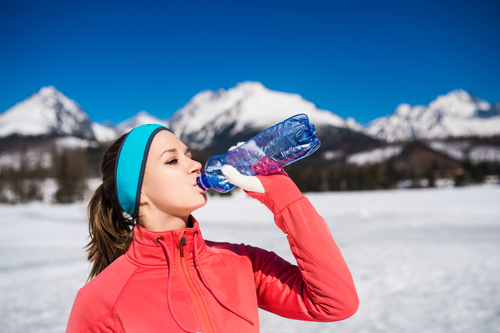Winter brings many wonderful things, from new cross-training opportunities to the start of winter sports. Whether you participate in winter sports or it’s now the off-season for you, winter training can bring with it a whole set of challenges. To lower your risk of injury, these challenges need to be taken into account. From slipping on ice to dehydration (yes, dehydration), it’s important to adapt your training to the winter season.
1. Hydrate, hydrate, hydrate
Hydration seems like something you wouldn’t have to worry about as it’s usually the hot summer months that bring about dehydration problems. However, contrary to popular belief, dehydration is quite common during the winter months as well. Other than the obvious negative health effects associated with dehydration, during the cold months, it can lead to serious illness as it can lower your immune system drastically. During the winter, it’s important to pay extra-careful attention to drinking enough water as thirst becomes less noticeable when your skin temperature drops.
2. Stay dry
It may be difficult to do when you’re outside training, but it’s important to stay dry to avoid hypothermia. If you’re outside in freezing or below-freezing temperatures and it’s windy, it may seem impossible to sweat. However, if you overdress or wear the wrong type of clothing, you could be setting yourself up for the extreme shivers. The tip for staying dry is to wear the right kind of clothing as well as the right amount, so your body can vent sweat properly. You don’t want to underdress, but you also don’t want to overdress, causing you to sweat more than you should.
3. Pay attention and change your pace
It’s important to pay attention to your surroundings to help avoid slipping or falling. You may not be one to look at your feet while running or walking, but looking ahead at the ground will help you spot ice to avoid. Furthermore, changing your pace can also help you avoid a disaster. You may want to take it slower if there’s a high chance of ice or if there’s a lot of snow on the ground. You may also want to consider wearing shoes that do a better job of gripping ice and snow.
4. Winter training is about adjustment
Adjust the time you spend training outside during the winter months. Even with proper gear, it may not be the safest thing to be outside for long periods of time, especially in higher altitudes and the mountains where the temperatures can drop and the wind chill brings the temperature even lower.
Pay attention to the weather and keep track of how long you’re outside. The colder it is, the more your body has to work to keep warm, which means you are using more energy to stay active. This can lead to fatigue, which can lead to mistakes, falls and injuries. Adjust your winter training to account for these things and you’ll have a successful winter season — or winter off-season.
Visit SOL today for performance training
Staying fit during the winter is important if you’re an athlete or even if you are just looking for ways to stay active and healthy. Regardless of your goal, our team is here to help. We offer a variety of performance training programs that can benefit people of all fitness levels and backgrounds to receive the training they need. Contact our team today for more information about training during the winter or to schedule an initial appointment.


